Books on consciousness
A list of books relating to the hard problem of consciousness. Regularly updated cos I keep finding new stuff all the time.
A list of books relating to the hard problem of consciousness. Regularly updated cos I keep finding new stuff all the time.
2013
 Samuel C. Rickless
Samuel C. Rickless
Berkeley’s Argument for Idealism
(Oxford 2013)
A novel interpretation of the thought of George Berkeley. According to Rickless, Berkeley’s argument for idealism rests on the distinction between mediate and immediate perception and in particular on the thesis that everything that is perceived by means of the senses is immediately perceived. Rickless concludes that the argument is valid and may well be sound. See Oxford | Amazon | Google
 John Scanlan
John Scanlan
Memory: Encounters with the Strange and the Familiar
(Reaktion Books 2018)
The surfeit of available past experience in the current digital revolution threatens to overwhelm the present. The present blurs into the past, undermining our sense of tangible reality. Drawing on history, philosophy and technology, Scanlan conducts an engaging investigation of how the phenomenon of memory continually remakes everyday life. See Reaktion Books | Amazon | Google
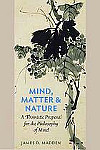 James D. Madden
James D. Madden
Mind, Matter, and Nature: A Thomistic Proposal for the Philosophy of Mind
(Catholic University of America Press 2013)
Many philosophers regard hylomorphism—the idea that living material substances are not just matter, but compounds of matter and soul—as a historical curiosity or as inherently obscure. Madden offers an introduction to contemporary philosophy of mind on its own terms that concludes that the hylomorphic philosophy of St. Thomas Aquinas offers the best approach. See HFS Books | Amazon | Google
 Robert J. Howell
Robert J. Howell
Consciousness and the Limits of Objectivity: The Case for Subjective Physicalism
(Oxford 2013)
After developing a novel, neo-Cartesian notion of the physical and considering the three major anti-materialist arguments—Black’s Presentation Problem, Jackson’s Knowledge Argument and Chalmers’ Conceivability Argument—Howell proposes a ‘subjective physicalism’ which gives consciousness its due while retaining the advantages of a monistic, physical ontology. See Oxford | Amazon | Google
 Jordi Fernández
Jordi Fernández
Transparent Minds: A Study of Self-Knowledge
(Oxford 2013)
How do we know our own states of mind? Drawing on the ‘transparency’ of belief, Fernández proposes that we attribute beliefs and desires to ourselves based on our grounds for them. Self-knowledge is not a matter of introspection. We come to know what we believe and desire by ‘looking outward’ and attending to the states of affairs they are about. See Oxford | Amazon | Google
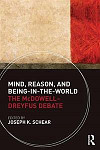 Joseph K. Schear (ed.)
Joseph K. Schear (ed.)
Mind, Reason, and Being-In-The-World: The McDowell-Dreyfus Debate
(Routledge 2013)
This book opens with the debate between McDowell and Dreyfus over whether experience is pervaded by conceptual rationality or whether experience marks the limits of reason. Thereafter, fifteen specially-commissioned chapters by distinguished contributors enrich the debate by taking it in a number of different and important directions. See Routledge | Amazon | Google
 Lynne Rudder Baker
Lynne Rudder Baker
Naturalism and the First-Person Perspective
(Oxford 2013)
Science and Naturalism represent reality in wholly non-personal terms. How, if at all, can a non-personal scheme accommodate the first-person perspective that we all enjoy? After considering both reductive and eliminative approaches, Baker argues that a non-Cartesian first-person perspective belongs in the basic inventory of what exists. See Oxford | Amazon | Google
 Ulrich Meyer
Ulrich Meyer
The Nature of Time
(Oxford 2013)
The theory of relativity convinced many that space and time are mere aspects of a more fundamental space-time. Meyer argues against this view. Instead of a ‘spatial’ account of time that treats instants like positions in space, he puts forth a ‘modal’ account that emphasizes the similarities between times and the possible worlds in modal logic. See Oxford | Amazon | Google
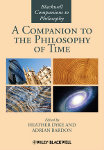 Heather Dyke & Adrian Bardon (eds.)
Heather Dyke & Adrian Bardon (eds.)
A Companion to the Philosophy of Time
(Wiley-Blackwell 2013)
In this unparalleled reference work, thirty two specially-commissioned articles address the historical development of the philosophy of time as well as prominent contemporary work. The essays range over the history of the philosophy of time, time as a feature of the physical world, and time as a feature of experience. See Wiley-Blackwell | Amazon | Google
 Patricia S. Churchland
Patricia S. Churchland
Touching a Nerve: The Self as Brain
(W. W. Norton 2013)
What happens when we accept that everything we feel and think stems not from an immaterial spirit but from electrical and chemical activity in our brains? In this thought-provoking narrative, Churchland reflects with humor on how she came to harmonize science and philosophy, the mind and the brain, abstract ideals and daily life. See W. W. Norton | Amazon | Google
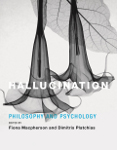 Fiona Macpherson & D. Platchias (eds.)
Fiona Macpherson & D. Platchias (eds.)
Hallucination: Philosophy and Psychology
(MIT 2013)
This volume features perspectives on hallucination by both philosophers and scientists. Topics from scientists include neurobiological mechanisms underlying hallucination and the nature of auditory-verbal hallucinations. Philosophical discussion includes a consideration of disjunctivism and the relation between hallucination and experience. See MIT | Amazon | Google
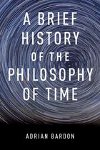 Adrian Bardon
Adrian Bardon
A Brief History of the Philosophy of Time
(Oxford 2013)
A brilliant introduction to the history, philosophy and science of time from the pre-Socratics through Einstein and beyond. Covers time and change, the experience of time, physical and metaphysical approaches to time, the direction of time, time-travel, freedom of the will, and scientific and philosophical approaches to eternity and the beginning of time. See Oxford | Amazon | Google
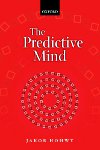 Jakob Hohwy
Jakob Hohwy
The Predictive Mind
(Oxford 2013)
A fascinating new theory is taking hold in neuroscience, namely, that the brain is essentially a hypothesis-testing mechanism that attempts to minimise the error of its predictions about the sensory input it receives from the world. Jakob Hohwy explains this theory from the perspectives of both cognitive science and philosophy. See Oxford | Amazon | Google
 L. A. Paul & Ned Hall
L. A. Paul & Ned Hall
Causation: A User’s Guide
(Oxford 2013)
A guide to philosophical treatments of causation, with special attention to counterfactual and related analyses. The authors clarify the central themes of the debate and also examine several contemporary proposals for analyzing the nature of causation, providing the reader with a broad and sophisticated view of the metaphysics of the causal relation. See Oxford | Amazon | Google
 Matthew Soteriou
Matthew Soteriou
The Mind’s Construction: The Ontology of Mind and Mental Action
(Oxford 2013)
Not all aspects of the mind fill time in the same way. For example, some mental phenomena obtain over intervals of time, others unfold over time, and some continue to occur throughout intervals of time. Soteriou explores these distinctions and shows how they illuminate philosophical accounts of both sensory and cognitive aspects of our conscious mental lives. See Oxford | Amazon | Google
 Thomas Natsoulas
Thomas Natsoulas
Consciousness and Perceptual Experience
(Cambridge 2013)
Natsoulas offers an approach to perception that is both phenomenological and ecological. He argues that our stream of consciousness provides us with firsthand contact with the world, as opposed to theoretical items such as mental representations, internal pictures, or sense-image models, none of which can have effects on our sensory receptors. See Cambridge | Amazon | Google
 Charles Travis
Charles Travis
Perception: Essays After Frege
(Oxford 2013)
Travis presents a series of connected essays in the philosophy of perception. The book is informed by Fregean insights about differences between objects of thought and objects of perception, and about the essential publicity of thought, and hence of its objects. Besides Frege, much is owed to J. L. Austin, J. M. Hinton, John McDowell and Thompson Clarke. See Oxford | Amazon | Google
 Jesse Butler
Jesse Butler
Rethinking Introspection
(Palgrave Macmillan 2013)
We seem to have private access to our minds through introspection but do we literally perceive our own minds, as the common idea of a ‘mind’s eye’ suggests? Butler offers a new pluralist framework for understanding introspection and argues that it does not consist of a single mechanism but a diverse range of mental states and processes. See Palgrave Macmillan | Amazon | Google
 Anne Jaap Jacobson
Anne Jaap Jacobson
Keeping the World in Mind: Mental Representations and the Sciences of the Mind
(Palgrave Macmillan 2013)
There have been two major models of the mind’s relation to its environment in Western thought. The newer one, dominant today, takes the mind to have states about its environment. The older one, originating with Aristotle, takes the mind to sample its environment. Jacobson clarifies the old notion and explains its potential. See Palgrave Macmillan | Amazon | Google | 3:AM Interview
 Uriah Kriegel (ed.)
Uriah Kriegel (ed.)
Current Controversies in Philosophy of Mind
(Routledge 2013)
In this collection of ten new essays, philosophers square off on five central debates currently engaging the field. The five debates include the prospects for Russellian monism, the scope and nature of embodied cognition, representationalism and the phenomenology of moods, the project of naturalization, and the importance of consciousness. See Routledge | Amazon | Google
 Richard Swinburne
Richard Swinburne
Mind, Brain, and Free Will
(Oxford 2013)
Revisiting the issues of his 1986 book The Evolution of the Soul, Swinburne now provides deeper and more satisfying grounds for upholding the metaphysical theses of substance dualism and libertarian free will. He provides a full discussion of underlying philosophical issues and takes into account important results of recent neuroscience. See Oxford | Amazon | Google
 Istvan Aranyosi
Istvan Aranyosi
The Peripheral Mind: Philosophy of Mind and the Peripheral Nervous System
(Oxford 2013)
Should philosophers of mind shift their focus to the peripheral nervous system? Aranyosi argues that peripheral processes may be constitutive of sensory states rather than mere causal contributors. He offers novel solutions to puzzles about physicalism, functionalism, mental content, embodiment, the extended mind hypothesis, as well as to some problems in neuroethics. See Oxford | Google
 Richard Fumerton
Richard Fumerton
Knowledge, Thought, and the Case for Dualism
(Cambridge 2013)
Fumerton’s primary concern is the knowledge argument for dualism—an argument that turns on the thought that we can know truths about our existence and our mental states without knowing any truths about the physical world. While this thought has come under relentless criticism, Fumerton makes a powerful case for its rehabilitation. See Cambridge | Google
 Robert Kirk
Robert Kirk
The Conceptual Link from Physical to Mental
(Oxford 2013)
In this book, Kirk argues that physicalists must hold that the physical truth “logico-conceptually” entails the mental truth. He argues that such ‘redescriptive physicalism’ is free of the problems that mental causation raises for other non-reductive views and shows also that Cartesian intuitions of zombies and transposed qualia are false. See Oxford | Google
 Uriah Kriegel (ed.)
Uriah Kriegel (ed.)
Phenomenal Intentionality
(Oxford 2013)
Since the late 1970s, philosophers have been trying to “naturalize” intentionality—the mind’s ability to direct itself onto the world. But some are now arguing that phenomenal consciousness plays an essential role in the theory of intentionality, one missing in the naturalization program. This volume offers twelve new essays from the forefront of the field. See Oxford | Google
 Michael S. A. Graziano
Michael S. A. Graziano
Consciousness and the Social Brain
(Oxford 2013)
How can a brain be conscious? Graziano lays out an audacious new theory. The brain has evolved a complex circuitry that allows it to be socially intelligent. One of its functions is to attribute awareness to others. Graziano proposes that the machinery responsible for this also attributes awareness to oneself: damage it and you disrupt your own awareness. See Oxford | Google
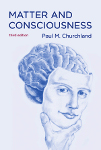 Paul M. Churchland
Paul M. Churchland
Matter and Consciousness
(MIT 2013, 3rd edition)
The third edition of this classic introductory text, updated and revised throughout, taking into account numerous recent developments. (Previous editions 1984, 1988.) Churchland presents a concise and contemporary overview of the philosophical issues surrounding the mind and explains the positions that have been proposed to solve them. See MIT | Google
 Alvin I. Goldman
Alvin I. Goldman
Joint Ventures: Mindreading, Mirroring, and Embodied Cognition
(Oxford 2013)
What distinguishes us from other species? One candidate is our facility at mutual understanding: our ability to ascribe thoughts, desires, and feelings to one another, by putting ourselves in other’s shoes. This collection of essays by Alvin Goldman includes many which have played a major role in crystallizing this simulation, or empathizing, account of mindreading. See Oxford | Amazon | Google

Berkeley’s Argument for Idealism
(Oxford 2013)

A novel interpretation of the thought of George Berkeley. According to Rickless, Berkeley’s argument for idealism rests on the distinction between mediate and immediate perception and in particular on the thesis that everything that is perceived by means of the senses is immediately perceived. Rickless concludes that the argument is valid and may well be sound. See Oxford | Amazon | Google

Memory: Encounters with the Strange and the Familiar
(Reaktion Books 2018)
The surfeit of available past experience in the current digital revolution threatens to overwhelm the present. The present blurs into the past, undermining our sense of tangible reality. Drawing on history, philosophy and technology, Scanlan conducts an engaging investigation of how the phenomenon of memory continually remakes everyday life. See Reaktion Books | Amazon | Google

Mind, Matter, and Nature: A Thomistic Proposal for the Philosophy of Mind
(Catholic University of America Press 2013)
Many philosophers regard hylomorphism—the idea that living material substances are not just matter, but compounds of matter and soul—as a historical curiosity or as inherently obscure. Madden offers an introduction to contemporary philosophy of mind on its own terms that concludes that the hylomorphic philosophy of St. Thomas Aquinas offers the best approach. See HFS Books | Amazon | Google

Consciousness and the Limits of Objectivity: The Case for Subjective Physicalism
(Oxford 2013)
After developing a novel, neo-Cartesian notion of the physical and considering the three major anti-materialist arguments—Black’s Presentation Problem, Jackson’s Knowledge Argument and Chalmers’ Conceivability Argument—Howell proposes a ‘subjective physicalism’ which gives consciousness its due while retaining the advantages of a monistic, physical ontology. See Oxford | Amazon | Google

Transparent Minds: A Study of Self-Knowledge
(Oxford 2013)
How do we know our own states of mind? Drawing on the ‘transparency’ of belief, Fernández proposes that we attribute beliefs and desires to ourselves based on our grounds for them. Self-knowledge is not a matter of introspection. We come to know what we believe and desire by ‘looking outward’ and attending to the states of affairs they are about. See Oxford | Amazon | Google

Mind, Reason, and Being-In-The-World: The McDowell-Dreyfus Debate
(Routledge 2013)
This book opens with the debate between McDowell and Dreyfus over whether experience is pervaded by conceptual rationality or whether experience marks the limits of reason. Thereafter, fifteen specially-commissioned chapters by distinguished contributors enrich the debate by taking it in a number of different and important directions. See Routledge | Amazon | Google

Naturalism and the First-Person Perspective
(Oxford 2013)
Science and Naturalism represent reality in wholly non-personal terms. How, if at all, can a non-personal scheme accommodate the first-person perspective that we all enjoy? After considering both reductive and eliminative approaches, Baker argues that a non-Cartesian first-person perspective belongs in the basic inventory of what exists. See Oxford | Amazon | Google

The Nature of Time
(Oxford 2013)
The theory of relativity convinced many that space and time are mere aspects of a more fundamental space-time. Meyer argues against this view. Instead of a ‘spatial’ account of time that treats instants like positions in space, he puts forth a ‘modal’ account that emphasizes the similarities between times and the possible worlds in modal logic. See Oxford | Amazon | Google

A Companion to the Philosophy of Time
(Wiley-Blackwell 2013)

In this unparalleled reference work, thirty two specially-commissioned articles address the historical development of the philosophy of time as well as prominent contemporary work. The essays range over the history of the philosophy of time, time as a feature of the physical world, and time as a feature of experience. See Wiley-Blackwell | Amazon | Google

Touching a Nerve: The Self as Brain
(W. W. Norton 2013)
What happens when we accept that everything we feel and think stems not from an immaterial spirit but from electrical and chemical activity in our brains? In this thought-provoking narrative, Churchland reflects with humor on how she came to harmonize science and philosophy, the mind and the brain, abstract ideals and daily life. See W. W. Norton | Amazon | Google

Hallucination: Philosophy and Psychology
(MIT 2013)
This volume features perspectives on hallucination by both philosophers and scientists. Topics from scientists include neurobiological mechanisms underlying hallucination and the nature of auditory-verbal hallucinations. Philosophical discussion includes a consideration of disjunctivism and the relation between hallucination and experience. See MIT | Amazon | Google

A Brief History of the Philosophy of Time
(Oxford 2013)

A brilliant introduction to the history, philosophy and science of time from the pre-Socratics through Einstein and beyond. Covers time and change, the experience of time, physical and metaphysical approaches to time, the direction of time, time-travel, freedom of the will, and scientific and philosophical approaches to eternity and the beginning of time. See Oxford | Amazon | Google

The Predictive Mind
(Oxford 2013)
A fascinating new theory is taking hold in neuroscience, namely, that the brain is essentially a hypothesis-testing mechanism that attempts to minimise the error of its predictions about the sensory input it receives from the world. Jakob Hohwy explains this theory from the perspectives of both cognitive science and philosophy. See Oxford | Amazon | Google

Causation: A User’s Guide
(Oxford 2013)
A guide to philosophical treatments of causation, with special attention to counterfactual and related analyses. The authors clarify the central themes of the debate and also examine several contemporary proposals for analyzing the nature of causation, providing the reader with a broad and sophisticated view of the metaphysics of the causal relation. See Oxford | Amazon | Google

The Mind’s Construction: The Ontology of Mind and Mental Action
(Oxford 2013)
Not all aspects of the mind fill time in the same way. For example, some mental phenomena obtain over intervals of time, others unfold over time, and some continue to occur throughout intervals of time. Soteriou explores these distinctions and shows how they illuminate philosophical accounts of both sensory and cognitive aspects of our conscious mental lives. See Oxford | Amazon | Google

Consciousness and Perceptual Experience
(Cambridge 2013)
Natsoulas offers an approach to perception that is both phenomenological and ecological. He argues that our stream of consciousness provides us with firsthand contact with the world, as opposed to theoretical items such as mental representations, internal pictures, or sense-image models, none of which can have effects on our sensory receptors. See Cambridge | Amazon | Google

Perception: Essays After Frege
(Oxford 2013)
Travis presents a series of connected essays in the philosophy of perception. The book is informed by Fregean insights about differences between objects of thought and objects of perception, and about the essential publicity of thought, and hence of its objects. Besides Frege, much is owed to J. L. Austin, J. M. Hinton, John McDowell and Thompson Clarke. See Oxford | Amazon | Google

Rethinking Introspection
(Palgrave Macmillan 2013)
We seem to have private access to our minds through introspection but do we literally perceive our own minds, as the common idea of a ‘mind’s eye’ suggests? Butler offers a new pluralist framework for understanding introspection and argues that it does not consist of a single mechanism but a diverse range of mental states and processes. See Palgrave Macmillan | Amazon | Google

Keeping the World in Mind: Mental Representations and the Sciences of the Mind
(Palgrave Macmillan 2013)
There have been two major models of the mind’s relation to its environment in Western thought. The newer one, dominant today, takes the mind to have states about its environment. The older one, originating with Aristotle, takes the mind to sample its environment. Jacobson clarifies the old notion and explains its potential. See Palgrave Macmillan | Amazon | Google | 3:AM Interview

Current Controversies in Philosophy of Mind
(Routledge 2013)
In this collection of ten new essays, philosophers square off on five central debates currently engaging the field. The five debates include the prospects for Russellian monism, the scope and nature of embodied cognition, representationalism and the phenomenology of moods, the project of naturalization, and the importance of consciousness. See Routledge | Amazon | Google

Mind, Brain, and Free Will
(Oxford 2013)
Revisiting the issues of his 1986 book The Evolution of the Soul, Swinburne now provides deeper and more satisfying grounds for upholding the metaphysical theses of substance dualism and libertarian free will. He provides a full discussion of underlying philosophical issues and takes into account important results of recent neuroscience. See Oxford | Amazon | Google

The Peripheral Mind: Philosophy of Mind and the Peripheral Nervous System
(Oxford 2013)
Should philosophers of mind shift their focus to the peripheral nervous system? Aranyosi argues that peripheral processes may be constitutive of sensory states rather than mere causal contributors. He offers novel solutions to puzzles about physicalism, functionalism, mental content, embodiment, the extended mind hypothesis, as well as to some problems in neuroethics. See Oxford | Google

Knowledge, Thought, and the Case for Dualism
(Cambridge 2013)
Fumerton’s primary concern is the knowledge argument for dualism—an argument that turns on the thought that we can know truths about our existence and our mental states without knowing any truths about the physical world. While this thought has come under relentless criticism, Fumerton makes a powerful case for its rehabilitation. See Cambridge | Google

The Conceptual Link from Physical to Mental
(Oxford 2013)
In this book, Kirk argues that physicalists must hold that the physical truth “logico-conceptually” entails the mental truth. He argues that such ‘redescriptive physicalism’ is free of the problems that mental causation raises for other non-reductive views and shows also that Cartesian intuitions of zombies and transposed qualia are false. See Oxford | Google

Phenomenal Intentionality
(Oxford 2013)
Since the late 1970s, philosophers have been trying to “naturalize” intentionality—the mind’s ability to direct itself onto the world. But some are now arguing that phenomenal consciousness plays an essential role in the theory of intentionality, one missing in the naturalization program. This volume offers twelve new essays from the forefront of the field. See Oxford | Google

Consciousness and the Social Brain
(Oxford 2013)
How can a brain be conscious? Graziano lays out an audacious new theory. The brain has evolved a complex circuitry that allows it to be socially intelligent. One of its functions is to attribute awareness to others. Graziano proposes that the machinery responsible for this also attributes awareness to oneself: damage it and you disrupt your own awareness. See Oxford | Google

Matter and Consciousness
(MIT 2013, 3rd edition)

The third edition of this classic introductory text, updated and revised throughout, taking into account numerous recent developments. (Previous editions 1984, 1988.) Churchland presents a concise and contemporary overview of the philosophical issues surrounding the mind and explains the positions that have been proposed to solve them. See MIT | Google

Joint Ventures: Mindreading, Mirroring, and Embodied Cognition
(Oxford 2013)
What distinguishes us from other species? One candidate is our facility at mutual understanding: our ability to ascribe thoughts, desires, and feelings to one another, by putting ourselves in other’s shoes. This collection of essays by Alvin Goldman includes many which have played a major role in crystallizing this simulation, or empathizing, account of mindreading. See Oxford | Amazon | Google
Menu
 What’s a logical paradox?
What’s a logical paradox? Achilles & the tortoise
Achilles & the tortoise The surprise exam
The surprise exam Newcomb’s problem
Newcomb’s problem Newcomb’s problem (sassy version)
Newcomb’s problem (sassy version) Seeing and being
Seeing and being Logic test!
Logic test! Philosophers say the strangest things
Philosophers say the strangest things Favourite puzzles
Favourite puzzles Books on consciousness
Books on consciousness Philosophy videos
Philosophy videos Phinteresting
Phinteresting Philosopher biographies
Philosopher biographies Philosopher birthdays
Philosopher birthdays Draft
Draftbarang 2009-2024  wayback machine
wayback machine
 wayback machine
wayback machine